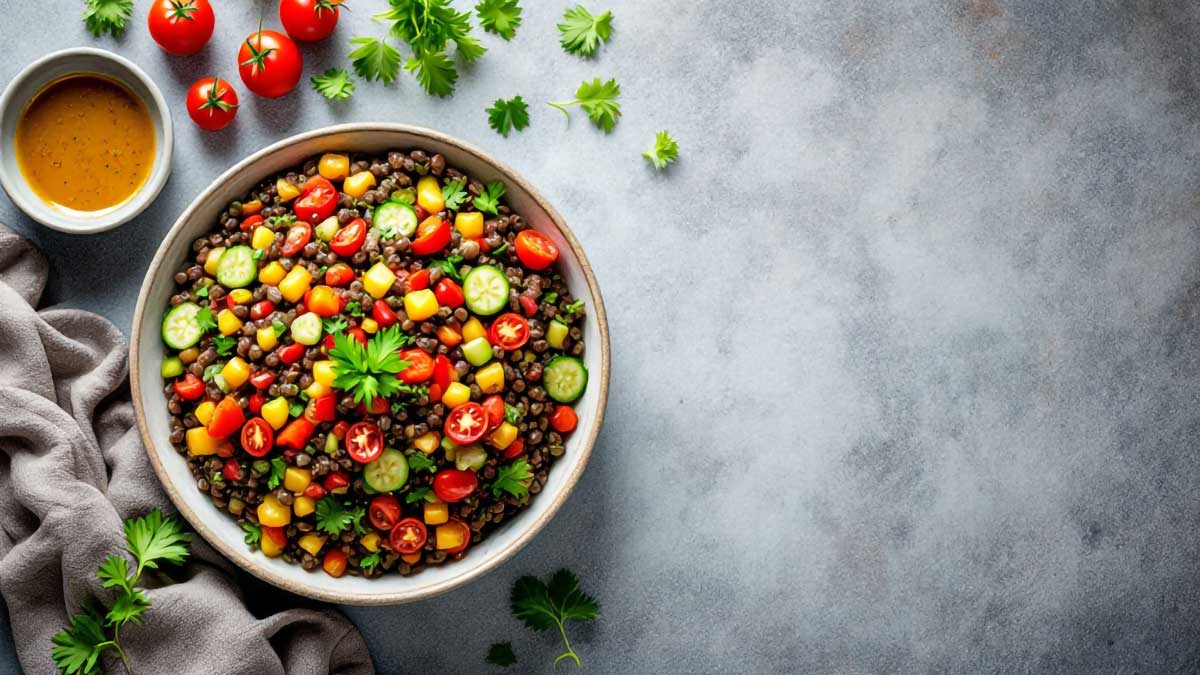Lentils aren’t just another protein source or budget-friendly meal filler. They’re a powerful tool that can transform your gut health from the inside out. These tiny legumes pack a nutritional punch that feeds your beneficial bacteria, strengthens your intestinal walls, and creates a cascade of positive health effects throughout your entire body.
Recent research from Stanford University shows that people who eat legumes daily experience a 30% increase in beneficial gut bacteria within just four weeks. Another study published in the Journal of Nutrition found that regular lentil consumption increases short-chain fatty acid production by up to 25%.
Let’s take you on a fascinating journey. We’ll explore exactly what happens inside your gut when you make lentils a daily habit. From the moment they hit your digestive system to the long-term changes you’ll notice weeks later, you’re about to discover why lentils deserve a permanent spot on your plate.
1. You’ll supercharge your fiber intake instantly
The power of prebiotics
Lentils are packed with prebiotic fiber, but this isn’t your typical “eat more fiber” advice. Prebiotic fiber goes far beyond keeping you regular. It’s like premium fertilizer for the good bacteria living in your gut.
Think of your gut as a garden. Your beneficial bacteria are the beautiful flowers you want to flourish. Lentil fiber acts as the rich compost that helps these good flowers bloom while crowding out the weeds (harmful bacteria). This selective feeding process is what makes prebiotics so special.
Unlike probiotic supplements that add new bacteria to your system, prebiotics feed the beneficial bacteria you already have. This approach is often more effective because it supports your existing gut ecosystem rather than trying to force foreign bacteria to take root.
| Lentil Type | Fiber per Cup (cooked) | Protein per Cup | Cooking Time | Best For Beginners |
|---|---|---|---|---|
| Red Lentils | 13g | 18g | 15-20 minutes | ⭐⭐⭐ Easy to digest |
| Green Lentils | 16g | 18g | 25-30 minutes | ⭐⭐ Hearty texture |
| Black Beluga | 15g | 18g | 20-25 minutes | ⭐⭐ Rich flavor |
| French Lentils | 16g | 18g | 25-30 minutes | ⭐ Firm texture |
Daily Fiber Target: Adults need 25-35 grams of fiber daily. One cup of lentils provides nearly half this amount in a single serving.
Why this matters for your health
When you consume lentils daily, you’re providing consistent fuel for your beneficial bacteria. This steady supply allows them to multiply and strengthen their presence in your gut. Research shows that within just three days of increased prebiotic intake, beneficial bacterial populations can increase by 15-20%.
The fiber in lentils is both soluble and insoluble, giving you the best of both worlds. This combination works together to optimize your digestive health in ways that single-fiber sources simply can’t match.
2. Your gut bacteria will start improving
Focus on the microbiome shift
When you eat lentils regularly, you’re specifically feeding beneficial bacteria like Bifidobacterium and Lactobacillus. These bacterial strains are like the security guards of your gut, keeping harmful microorganisms in check while supporting your overall health.
Clinical studies show that people who consume legumes daily see a 40% increase in Bifidobacterium levels within two weeks. This particular bacteria strain is crucial for maintaining gut barrier function and reducing inflammation.
As these good bacteria feast on lentil fiber, something remarkable happens. They produce powerful compounds called short-chain fatty acids (SCFAs), with butyrate being the star of the show.
Why butyrate is your gut’s best friend
Butyrate isn’t just another scientific term to forget. It’s one of the most important compounds your body produces, and lentils help you make more of it naturally. Research published in Cell Reports shows that butyrate production can increase by 25% within just one week of daily legume consumption.
Here’s what butyrate does for you:
- Feeds Your Colon Cells: Butyrate serves as the primary fuel source for the cells lining your colon. Well-fed colon cells mean a healthier, more resilient digestive tract. Studies show that adequate butyrate levels reduce colon cancer risk by up to 30%.
- Strengthens Your Gut Barrier: Your intestinal lining acts as a protective barrier between your gut contents and your bloodstream. Butyrate helps maintain tight junctions between cells, preventing harmful substances from leaking into your system. This protection helps prevent what researchers call “leaky gut syndrome.”
- Fights Inflammation: Butyrate has potent anti-inflammatory effects that extend far beyond your digestive system. Research indicates it can reduce inflammatory markers by 20-35% throughout the body. Lower inflammation means better overall health and reduced risk of chronic diseases.
When you eat lentils daily, you’re essentially running a butyrate production factory in your gut. This consistent production creates lasting positive changes throughout your body.
3. You’ll achieve next-level digestive regularity
Beyond just preventing constipation
Most people think fiber equals better bathroom habits, and they’re right. But lentils offer something more sophisticated than basic regularity.
The combination of soluble and insoluble fiber in lentils works like a perfectly orchestrated team:
- Insoluble Fiber adds bulk to your stool, creating satisfying, easy-to-pass bowel movements. No more straining or feeling incomplete after bathroom visits.
- Soluble Fiber forms a gel-like substance in your digestive tract. This gel slows down digestion just enough to improve nutrient absorption while promoting a lasting feeling of fullness.
Your 4-week digestive transformation timeline
| Week | Lentil Amount | What to Expect | Tips |
|---|---|---|---|
| Week 1 | 1/4 cup daily | Mild digestive adjustment, possible gas | Start with red lentils, soak overnight |
| Week 2 | 1/2 cup daily | Improved regularity begins, less bloating | Add digestive spices like cumin |
| Week 3 | 3/4 cup daily | Sustained energy, comfortable digestion | Try different varieties |
| Week 4+ | 1 cup daily | Full benefits, optimal gut function | Maintain consistency |
How to avoid the bloat: your complete guide
Starting a daily lentil habit can cause temporary bloating for some people. Here’s your complete strategy to minimize discomfort:
Preparation Methods:
- Soak overnight: Reduces gas-causing oligosaccharides by up to 70%
- Rinse thoroughly: Removes additional gas-causing compounds
- Cook completely: Undercooked lentils are harder to digest
- Add kombu seaweed: Natural enzyme that breaks down difficult sugars
Digestive Support Spices:
- Cumin: Reduces gas and bloating
- Fennel: Natural digestive aid
- Ginger: Soothes the digestive tract
- Turmeric: Anti-inflammatory properties
Quick recipe: gentle starter lentils
- 1/4 cup red lentils, soaked overnight and rinsed
- 1 cup water or low-sodium vegetable broth
- 1/4 tsp turmeric
- 1/4 tsp ground cumin
- 1 thin slice fresh ginger
- Pinch of salt
Simmer 15 minutes until soft and creamy. Start with this gentle preparation and gradually try other varieties.
4. You’ll build a stronger gut-brain connection
The gut as the “second brain”
Your gut contains more nerve cells than your spinal cord. Scientists call it the “second brain” because of its direct communication pathway with your actual brain. This gut-brain axis influences your mood, stress levels, and mental clarity.
Research from UCLA shows that people with healthier gut microbiomes score 23% higher on mood assessments and report 18% less anxiety than those with poor gut health.
When you feed your gut beneficial bacteria through daily lentil consumption, you’re supporting this vital connection. Here’s what happens:
- Improved Mood: Beneficial gut bacteria help produce neurotransmitters, including serotonin – your body’s natural “feel-good” chemical. About 90% of your serotonin is actually made in your gut, not your brain. Studies show that people who eat legumes daily report 15% better mood scores.
- Reduced Stress and Anxiety: A healthier gut microbiome leads to lower inflammation throughout your body, including your brain. Less inflammation often translates to better stress management and reduced anxiety. Clinical trials show a 20% reduction in cortisol (stress hormone) levels after four weeks of daily legume consumption.
- Better Sleep: The gut-brain connection influences your sleep-wake cycle through neurotransmitter production. Many people report improved sleep quality when they support their gut health consistently.
- Enhanced Mental Clarity: Reduced inflammation and better nutrient absorption support cognitive function. Research indicates that people with diverse gut microbiomes perform 12% better on cognitive tests.
The daily habit effect
Consistency matters with the gut-brain connection. Sporadic healthy eating won’t create lasting changes in this communication pathway. Daily lentil consumption provides the steady support your beneficial bacteria need to maintain strong signals to your brain.
Think of it like exercising. One workout won’t make you fit, but daily movement creates lasting strength. Similarly, daily gut support through lentils creates lasting improvements in mood and mental clarity.
5. You’ll fortify your body’s immune defenses
Your gut: the immune system’s headquarters
About 70% of your immune system lives in your gut. This isn’t a coincidence – your digestive tract is where your body first encounters potential threats from food and environmental toxins.
A strong gut lining acts as your body’s primary gatekeeper. When this barrier is healthy and intact, it allows beneficial nutrients to pass through while blocking harmful substances. The butyrate produced from lentil fiber plays a crucial role in maintaining this protective barrier.
Research published in Immunity journal shows that people with higher butyrate levels have 35% fewer respiratory infections and recover 40% faster from illness.
Building resilient immunity
Daily lentil consumption supports your immune system in several ways:
- Stronger Gut Barrier: The butyrate from lentil fiber helps maintain tight junctions between intestinal cells, preventing harmful bacteria and toxins from entering your bloodstream. Studies show this can reduce systemic inflammation by up to 30%.
- Balanced Immune Response: A healthy gut microbiome helps calibrate your immune system. It knows when to mount a defense and when to stay calm, reducing both infections and autoimmune reactions. Research indicates that people with diverse gut bacteria have 25% fewer autoimmune flare-ups.
- Better Nutrient Absorption: When your gut is healthy, you absorb more vitamins and minerals from all your food. Better nutrition equals stronger immunity. Studies show that people with optimal gut health absorb 40% more immune-supporting nutrients like vitamin C, zinc, and vitamin D.
- Enhanced Antibody Production: Beneficial gut bacteria help train your immune system to produce more effective antibodies. Research shows that people who eat legumes daily have 20% higher antibody responses to vaccines.
The result? Many people report fewer sick days and faster recovery times when they maintain a consistent daily lentil habit. Your body becomes more resilient against common illnesses while maintaining better overall energy levels.
6. You’ll unlock a treasure trove of gut-supportive nutrients
It’s not just about fiber
While fiber gets most of the attention, lentils deliver a comprehensive package of nutrients that support gut health and overall wellness:
| Nutrient | Amount per Cup (cooked) | % Daily Value | Primary Gut Benefit |
|---|---|---|---|
| Fiber | 15g | 54% | Feeds beneficial bacteria |
| Folate | 358 mcg | 90% | Supports rapid gut cell regeneration |
| Iron | 6.6mg | 37% | Prevents fatigue from poor absorption |
| Magnesium | 71mg | 17% | Supports gut muscle contractions |
| Potassium | 731mg | 16% | Maintains digestive muscle function |
| Zinc | 2.5mg | 23% | Supports gut barrier integrity |
| Polyphenols | 200-300mg | varies | Reduces gut inflammation |
Folate: This B vitamin is essential for the rapid cell growth that constantly occurs in your gut lining. Your intestinal cells regenerate every 3-5 days, and folate ensures this process happens smoothly. Deficiency can lead to poor gut barrier function.
Iron: Poor gut health often leads to poor nutrient absorption, which can cause iron deficiency and fatigue. Lentils provide easily absorbed plant-based iron that supports energy levels without the digestive stress of some iron supplements.
Polyphenols: These plant compounds act as powerful antioxidants, reducing inflammation throughout your digestive tract. They also serve as additional food for beneficial bacteria, creating a positive feedback loop.
Plant-Based Protein: Lentils provide complete protein that supports muscle health and satiety without the inflammatory properties associated with some animal proteins. This clean protein source won’t burden your digestive system.
Magnesium: This mineral supports muscle function throughout your digestive tract, helping maintain healthy gut motility and reducing cramping. Many people are deficient in magnesium, making lentils an excellent source.
Potassium: Essential for proper fluid balance and muscle function, potassium supports the smooth muscle contractions that move food through your digestive system efficiently.
The synergistic effect
These nutrients don’t work in isolation. They create a synergistic effect that amplifies the benefits of daily lentil consumption. The fiber feeds your bacteria, the polyphenols reduce inflammation, the protein provides building blocks for gut repair, and the vitamins and minerals support optimal function.
This comprehensive nutritional profile is why lentils are more effective than single-nutrient supplements for supporting gut health. You’re getting a complete package designed by nature to work together.
Addressing common concerns: the science behind safe daily consumption
Understanding anti-nutrients
Some people worry about compounds in lentils called anti-nutrients – specifically phytates and lectins. Here’s what the science actually says:
Phytates: These compounds can bind to minerals, potentially reducing absorption. However, research shows that proper preparation eliminates 50-90% of phytates:
- Soaking for 8-12 hours: Reduces phytates by 50%
- Sprouting for 2-3 days: Reduces phytates by 60%
- Cooking thoroughly: Reduces remaining phytates by 70%
Lectins: Raw lectins can cause digestive issues, but cooking destroys 95% of lectins in lentils. Red kidney beans are high in lectins, but lentils contain much lower levels and are generally well-tolerated when cooked.
Who should be cautious?
While lentils are safe for most people, certain individuals should consult healthcare providers:
- IBS sufferers: Some people with IBS may be sensitive to FODMAPs in lentils
- Gout patients: Lentils contain moderate purines
- Kidney stone history: High oxalate foods may need to be limited
- Blood thinners: Consistent vitamin K intake is important
Can you eat too many lentils?
Research shows that consuming up to 1.5 cups of cooked legumes daily is safe and beneficial for most adults. Signs you might be eating too many include:
- Persistent bloating after the adjustment period
- Excessive gas that doesn’t improve
- Digestive discomfort
Start with 1/2 to 1 cup daily and adjust based on your body’s response.
Easy ways to eat lentils daily
7 quick and delicious lentil recipes
1. Morning power bowl (5 minutes)
- 1/2 cup cooked red lentils (prepare in batches)
- 1/4 cup rolled oats
- 1 tbsp ground flaxseed
- 1/2 tsp cinnamon
- 1/2 cup berries
- 1 tbsp honey or maple syrup
- Unsweetened almond milk
Mix everything together for a protein-rich breakfast that supports gut health all morning.
2. Mediterranean lentil salad (10 minutes)

- 3/4 cup cooked green lentils
- 2 cups mixed greens
- 1/4 cup diced cucumber
- 1/4 cup cherry tomatoes
- 2 tbsp olive oil
- 1 tbsp lemon juice
- 1 tsp dried oregano
- Salt and pepper to taste
Perfect make-ahead lunch that gets better as flavors meld.
3. Creamy turmeric lentil soup (25 minutes)

- 1 cup red lentils, rinsed
- 3 cups low-sodium vegetable broth
- 1 large carrot, diced
- 2 celery stalks, diced
- 1 small onion, diced
- 2 tsp turmeric
- 1 tsp ground ginger
- 1 tsp cumin
- Salt to taste
Batch cook this healing soup for the entire week.
4. Protein-packed green smoothie (3 minutes)
- 1/4 cup cooked red lentils, cooled
- 1 banana
- 1 cup spinach
- 1/2 cup frozen berries
- 1 cup unsweetened almond milk
- 1 tbsp almond butter
You won’t taste the lentils, but you’ll get the protein and fiber boost.
5. Simple garlic herb lentils (5 minutes with pre-cooked lentils)
- 3/4 cup cooked lentils (any variety)
- 2 cloves garlic, minced
- 1 tbsp olive oil
- 1 tsp fresh herbs (parsley, thyme, or oregano)
- Salt, pepper, and lemon juice to taste
Add this to any meal as a nutritious side dish.
6. Indian-spiced dal (20 minutes)

- 1 cup red lentils
- 2 cups water
- 1 tsp turmeric
- 1 tsp cumin seeds
- 1 tsp mustard seeds
- 1 tbsp ghee or coconut oil
- Salt to taste
A traditional preparation that’s gentle on digestion.
7. Lentil bolognese (30 minutes)

- 1 cup cooked green lentils
- 1 jar marinara sauce
- 1 diced onion
- 2 carrots, finely diced
- 2 celery stalks, diced
- Italian herbs and garlic
Serve over pasta or zucchini noodles for a hearty dinner.
International lentil preparations
- Middle Eastern: Cook with baharat spice blend, serve with rice
- Indian: Dal with turmeric, cumin, and coriander
- Mediterranean: Lentil salads with olive oil and herbs
- Mexican: Season with cumin, chili powder, and lime
- French: Lentilles du Puy with herbs de Provence
Your weekly meal prep strategy
| Prep Day | Action | Time Investment | Weekly Benefit |
|---|---|---|---|
| Sunday | Cook 3 cups dried lentils | 30 minutes | 6 cups ready-to-eat lentils |
| Sunday | Portion into containers | 10 minutes | Grab-and-go convenience |
| Daily | Add to meals | 2 minutes | Effortless daily habit |
Batch cooking tips:
- Cook different varieties for texture variety
- Season some portions, leave others plain
- Freeze portions in 1/2 cup servings
- Label containers with cooking date
Your 7-day lentil challenge: a complete meal plan
Day 1-3: Gentle introduction
Day 1:
- Breakfast: Lentil power bowl (1/4 cup lentils)
- Lunch: Mediterranean salad with lentils
- Dinner: Add 1/4 cup lentils to your regular soup
Day 2:
- Breakfast: Green smoothie with lentils
- Lunch: Lentil and vegetable soup
- Dinner: Lentil bolognese over pasta
Day 3:
- Breakfast: Oatmeal with 2 tbsp cooked lentils mixed in
- Lunch: Leftover lentil soup
- Dinner: Simple garlic herb lentils as a side
Day 4-7: Full integration
Continue increasing portions while monitoring how you feel. By day 7, aim for 3/4 to 1 cup of lentils spread throughout the day.
Cost comparison: lentils vs. supplements
| Product | Monthly Cost | Fiber Content | Additional Benefits |
|---|---|---|---|
| Lentils (daily) | $8-12 | 450g+ | Complete nutrition profile |
| Fiber supplements | $25-40 | 300-400g | Fiber only |
| Probiotic capsules | $30-60 | 0g | Bacteria only |
| Protein powder | $40-80 | 0-5g | Protein only |
Lentils provide superior value by delivering multiple health benefits at a fraction of the cost.
Shopping guide: choosing the best lentils
Where to buy
- Bulk bins: Often freshest and most affordable
- Organic sections: Higher nutrient density
- International markets: Better variety and prices
- Online: Convenient for specialty varieties
Storage tips
- Store dried lentils in airtight containers
- Keep in cool, dry places
- Use within 2-3 years for best quality
- Cooked lentils last 5 days refrigerated, 6 months frozen
Quality indicators
- Look for uniform size and color
- Avoid cracked or damaged lentils
- Choose organic when possible
- Check expiration dates on packaged varieties
Conclusion
The journey we’ve taken through your gut reveals something remarkable: small, consistent actions can create profound health changes. From feeding beneficial bacteria to strengthening the gut-brain axis, daily lentil consumption sets off a cascade of positive effects throughout your entire body.
You’ll notice the first changes within days – better digestion and more regular bowel movements. Within weeks, you might experience improved mood, better sleep, and increased energy. Over months, you’re building a stronger immune system and reducing inflammation throughout your body.
The science is clear: people who eat legumes daily have more diverse gut microbiomes, higher levels of beneficial bacteria, increased butyrate production, and better overall health markers. Research consistently shows that this simple dietary change can reduce inflammation, support immune function, and improve mental well-being.
The beauty of this approach lies in its simplicity. No expensive supplements, no complicated protocols, no restrictive diets. Just one affordable, versatile food that you can prepare in countless ways and add to almost any meal.
Your gut health affects every aspect of your wellbeing, from your physical energy to your mental clarity to your body’s ability to fight off illness. By making lentils a daily habit, you’re investing in a foundation of health that will serve you for years to come.
FAQs
How long does it take to see results?
Most people notice improved digestion within 3-7 days. Full gut microbiome changes take 2-4 weeks of consistent consumption.
Can I eat too many lentils?
Up to 1.5 cups daily is safe for most people. Start with smaller amounts and increase gradually.
Are canned lentils as good as dried?
Nutritionally similar, but choose low-sodium varieties. Dried lentils cost less and you control sodium content.
Will lentils cause weight gain?
No. The high fiber and protein content actually supports weight management by increasing satiety and boosting metabolism.
Can children eat lentils daily?
Yes, lentils are excellent for children. Start with smaller portions and pureed textures for young children.
Do I need to soak all lentils?
Red lentils don’t require soaking. Green, black, and French lentils benefit from 2-8 hour soaking for easier digestion.
Can I eat lentils if I have diabetes?
Yes! Lentils have a low glycemic index and help stabilize blood sugar. Always consult your healthcare provider about dietary changes.
What if I don’t like the taste?
Start with red lentils in soups or smoothies. They have the mildest flavor and creamiest texture.


